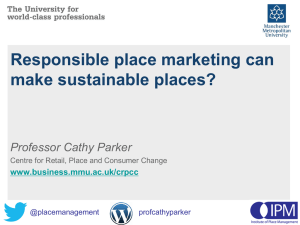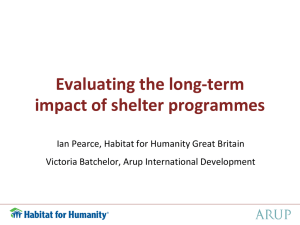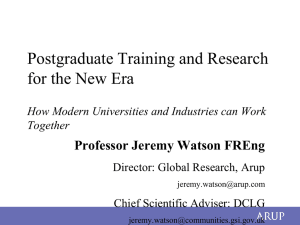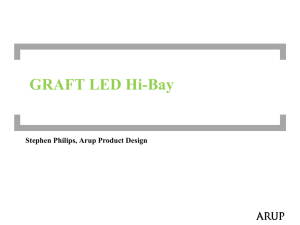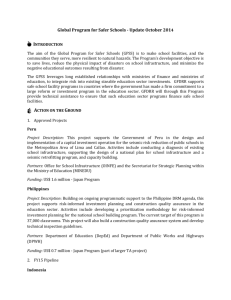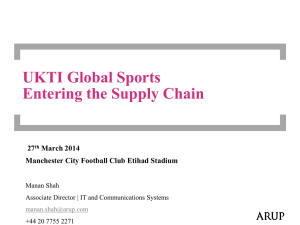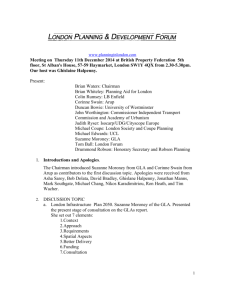Paper link - ALIA Information Online 2015
advertisement
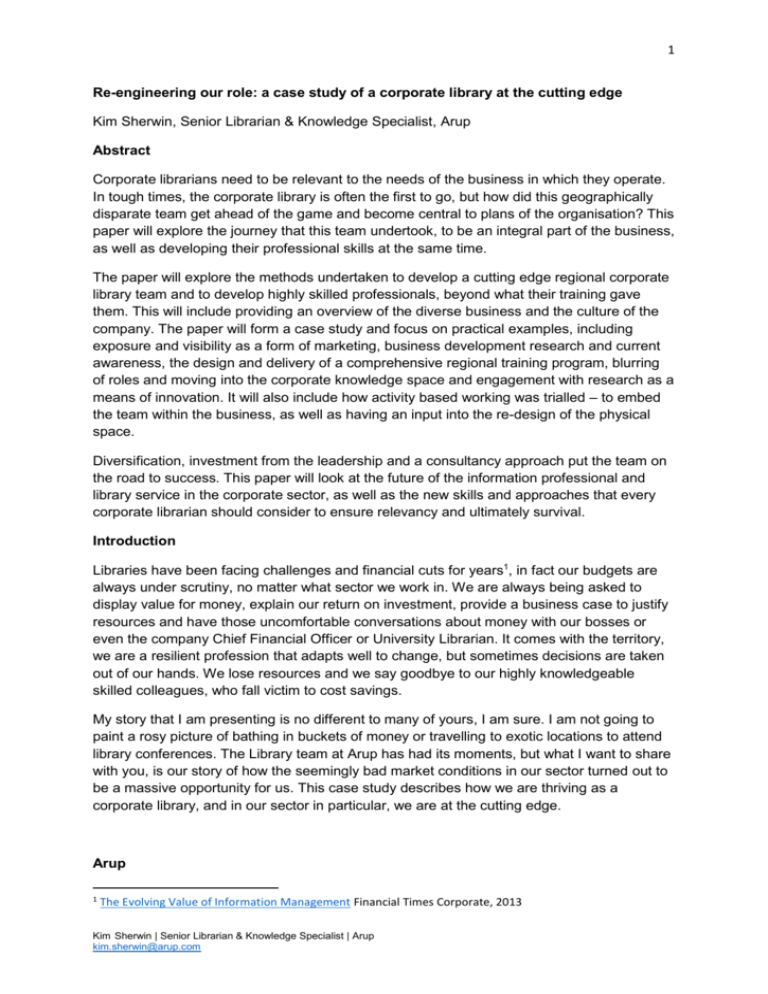
1 Re-engineering our role: a case study of a corporate library at the cutting edge Kim Sherwin, Senior Librarian & Knowledge Specialist, Arup Abstract Corporate librarians need to be relevant to the needs of the business in which they operate. In tough times, the corporate library is often the first to go, but how did this geographically disparate team get ahead of the game and become central to plans of the organisation? This paper will explore the journey that this team undertook, to be an integral part of the business, as well as developing their professional skills at the same time. The paper will explore the methods undertaken to develop a cutting edge regional corporate library team and to develop highly skilled professionals, beyond what their training gave them. This will include providing an overview of the diverse business and the culture of the company. The paper will form a case study and focus on practical examples, including exposure and visibility as a form of marketing, business development research and current awareness, the design and delivery of a comprehensive regional training program, blurring of roles and moving into the corporate knowledge space and engagement with research as a means of innovation. It will also include how activity based working was trialled – to embed the team within the business, as well as having an input into the re-design of the physical space. Diversification, investment from the leadership and a consultancy approach put the team on the road to success. This paper will look at the future of the information professional and library service in the corporate sector, as well as the new skills and approaches that every corporate librarian should consider to ensure relevancy and ultimately survival. Introduction Libraries have been facing challenges and financial cuts for years1, in fact our budgets are always under scrutiny, no matter what sector we work in. We are always being asked to display value for money, explain our return on investment, provide a business case to justify resources and have those uncomfortable conversations about money with our bosses or even the company Chief Financial Officer or University Librarian. It comes with the territory, we are a resilient profession that adapts well to change, but sometimes decisions are taken out of our hands. We lose resources and we say goodbye to our highly knowledgeable skilled colleagues, who fall victim to cost savings. My story that I am presenting is no different to many of yours, I am sure. I am not going to paint a rosy picture of bathing in buckets of money or travelling to exotic locations to attend library conferences. The Library team at Arup has had its moments, but what I want to share with you, is our story of how the seemingly bad market conditions in our sector turned out to be a massive opportunity for us. This case study describes how we are thriving as a corporate library, and in our sector in particular, we are at the cutting edge. Arup 1 The Evolving Value of Information Management Financial Times Corporate, 2013 Kim Sherwin | Senior Librarian & Knowledge Specialist | Arup kim.sherwin@arup.com 2 I should put into context the industry and company in which we operate in. I work for Arup2, if you were wondering what Arup means or stands for, it is the surname of our founder, Ove Arup. A Danish engineer and philosopher who founded the company back in 1946 in the United Kingdom. International projects that we have had involvement in, that you may be familiar with, include; the Aquatics Centre (the “Water Cube”) and “Birds Nest” stadium for the Beijing Olympics and the “Gherkin” in London. Across Australia you may be familiar with AAMI Park in Melbourne, One Shelley Street in Sydney and One One One Eagle Street in Brisbane. Initially Arup was a structural engineering company and we made our name with our structural engineering role for the Sydney Opera House. Today we have grown to be a global engineering and design consultancy, with over 11,000 staff working as part of a truly multidisciplinary organisation, with a reputation for delivering innovative and sustainable designs that reinvent the built environment. Our staff can be working on projects in just about any part of the world and not just in their own office or city. Arup is a unique company within our industry, we do not have any shareholders, we are a company held in trust and as employees we all own the company. It is an opportunity rich environment, which prides itself on technical excellence, innovative projects and a flat organisational structure. Just about anything is possible and I can tell you it is a Librarian’s dream! The Library I work as part of a geographically disparate team, with five full time equivalent colleagues in Brisbane, Melbourne, Perth, Singapore and Sydney, where I am based. Distance is one thing, but add three different time zones at certain times of the year and cultural differences of being a regional not country based practice; it makes for an interesting and diverse mix of ideas, research and again opportunities. To add to this we are also supported by colleagues in our East Asia and UK Middle East & Africa (UKMEA) regions, where Library teams are also based. I started with Arup in 2011, having been a Librarian in a range of sectors both in Australia and in the UK. From the outset the Library that I joined was progressive, proactive and providing added value to the business. The team’s focus had traditionally been technical based work. In an engineering and design consultancy, standards are our bread and butter as well as other technical documentation. The team is research based i.e. we do the work for our users, and as with any special library, the team are a jack of all trades. We had a regional team primarily serving the needs of their local office, each of which was slightly different in terms of technical and consulting disciplines. Opportunity rich The global financial crisis was slow to hit Australia, if it ever really did, but there was a knock on effect which impacted the engineering consulting sector as investment slowed down. The then Information & Library Services became caught up in this and we lost team members, as did other areas of our business. For many, this would be game changing with a reduction in services, resources and staff, but somehow it actually turned into an opportunity for us; again I use the word opportunity and we went on to “re-engineer” our role. 2 http://arup.com/ Kim Sherwin | Senior Librarian & Knowledge Specialist | Arup kim.sherwin@arup.com 3 The team realised that we actually had much more to offer and turned the downturn into a positive. We quickly grabbed an opportunity, seeing that in a competitive industry, our company needed to be well positioned to pounce on the more scarce opportunities and to be smarter about how we did business. That is not to say, of course, that they were not doing this already, but we felt we had a significant contribution to make by adding value to these efforts. We very quickly became the “go to team”, supported by, but also assisting our marketing teams, for business research. We took every possible opportunity to showcase our research skills and resources. Our concise but informative outputs had staff, including the senior leadership, quickly on board. They were using our services as a timely, efficient added value resource, to both inform business decisions, and also to be more knowledgeable about the markets in which we were operating in, ultimately keeping the business abreast of the prevailing economic conditions. In a very short amount of time, our team in each of our respective offices, were attending leadership meetings, industry sector meetings, business development meetings and were inundated with market intelligence research requests. We had found our niche and were highly engaged with our local teams and across the region in which we operate. Around this time we took a lead on current awareness, providing relevant content to our groups on industries, projects and clients. We would push out sector newsletters weekly summarising the week that was, using the resources that we had access to. At the time of writing this paper we are now providing a daily bulletin to interested staff, including the senior leadership, summarising key business and industry news from across our sectors. We continue to carry out in-depth research, not just in the market intelligence area, but also we are being asked more and more for in-depth technical research too. As librarians we just love being able to utilise these skills and the word has quickly spread about our capability. How did we do this? There are a few factors which contributed to this. The main one being the openness of the company, the limited bureaucracy and the fact that we are all stakeholders in the company. This made it easy for us to reach up and out with our offering. If the business is not performing, we all have a duty to pitch in to try and fix it. Also the size and geographic split of our team had a significant part to play. We had eyes and ears on the ground across most of our offices and given the “family” feel to our company, we already knew many of the key decision makers. It was a case of reacquainting ourselves and then demonstrating our capability. We quickly proved this and continue to be associated with our company’s approach to winning work. Training Library staff have long been engaged with user education and information literacy. Our team are the research “do-ers”, but we felt that we had a role to play in the education, training and awareness of our staff. Our company has a strong ethos related to training and the professional development of our staff, to enhance our technical knowledge and expertise. Many of our staff are required to be members of professional organisations, for example Engineers Australia. Chartership through Engineers Australia is a requirement for career progression, so we take the development of staff very seriously. To promote our team’s skills, resources and offerings we decided to create some short courses as part of the regional short course program, which runs throughout the year across our region. It includes Kim Sherwin | Senior Librarian & Knowledge Specialist | Arup kim.sherwin@arup.com 4 technical, as well as the softer skills training. The program is heavily integrated into our company’s training approach and to get something included in the program, which was deemed to be valuable and worthwhile, was a significant win for our team. Over the last couple of years we have ran training on standards and group specific training on our resources for our Transport and Resources, Consulting and Buildings groups. We have also developed an “Engineering our Knowledge” session on our knowledge tools and the most successful offering has been “Searching skills – beyond Google”; a hit across all areas of our business. These sessions are designed and delivered by our team – another string to our bow and an effective way to market our team. We also continue to have an ongoing role in the new starters’ induction and graduate program, ensuring early engagement with our team. Knowledge Arup invests significantly in knowledge sharing and its management. We are a knowledge based company, heavily reliant on our employee’s technical knowledge to deliver innovative projects. Not long after arriving at Arup, I became a Regional Knowledge Enthusiast and eventually landed the role of Regional Knowledge Activist, heading up knowledge sharing activities in the region. I had acquired this role but was still working the “library day job”. As the knowledge role progressed and my library role developed, there became a clear blurring of the lines between the two and I had the opportunity to formalise my role early in 2014. Knowledge is at the heart of everything we do. We generate knowledge from projects, research and experience. It is our aim to capture as much of this valuable knowledge as possible and develop ways of reusing it to improve efficiency and productivity. My role is not one to mandate knowledge management strategies, but to encourage the sharing of knowledge at a regional level. We have initiatives a plenty to encourage staff to share knowledge, for example in late 2014 we ran an initiative around our relationship with the Sydney Opera House. Collaboratively with the Arup Digital team, we encouraged staff to share their stories and memories of the Opera House, both digitally and also via a series of events. We even had a string quartet perform in the Sydney office one lunchtime as part of this initiative. Engagement was high and it was a fun way to encourage staff to share their knowledge. We are also working externally with other organisations and institutions in the knowledge sharing space. Having somebody (it just happens to be me) in this knowledge space, who also has the library and information background, is again another way in which our team can engage with the business and be immersed in a project based organisation, rather than be on the periphery. The opportunities are almost endless. Arup University Arup University is an internal structure which aims to foster the creative development of the people, knowledge and skills of our firm, including the development and promotion of our design abilities. Arup University in 2014 was given global and regional strategic importance, to drive our technical excellence, and is underpinned by sharing, communication and visibility. As with any quality university, there is a Library at the heart and early in 2014 our team became an integral part of Arup University. Supporting what we had already been Kim Sherwin | Senior Librarian & Knowledge Specialist | Arup kim.sherwin@arup.com 5 contributing to, but also raising our game in terms of assisting with our internal and external research agenda, as well as and being a key stakeholder in the engagement with our Skills Networks and their leadership. As part of our inclusion within Arup University, we also took this as an opportunity to rebrand ourselves. We are now simply known as the Library, having being called Information & Library Services for a time. It is a term that means something to staff, yes we provide a service but for us service implicated reactivity rather than proactivity. The name change was noted by many and it just made sense. Resources We continue to maintain and grow our online resources. Our Library intranet site is within the top ten most visited sites on our Essentials section of the intranet. This is not bad going given this is on a global intranet in a company of over 11,000 employees. To us, it demonstrates high usage and value of those online resources and is a connection to our team whether the user consciously or subconsciously knows it. Print is most definitely not dead within our organisation so we continue a collection development function also. We also make use of online tools to market our services, for example we are leaders in the use of Yammer3, which is in its infancy within Arup. We also maintain visibility across a number of others tools such as our staff online noticeboard, both in terms of promoting our resources but also how we add value, providing a “what’s in it for me” approach to our marketing. New places and spaces All of our offices are part of commercial tenancies, and a number of our offices are scheduled to move or undergo some refurbishments over the coming months and years. Given our visibility, coupled by our inclusion with Arup University, we are highly engaged in the plans. We are not the afterthought, we are actually amongst the first thoughts and are central to these plans and locations in the physical space. We are included in design meetings with our architects, part of the change process and we will start to see the first results of this in early 2015. Our Melbourne office has been undertaking Activity Based Working (ABW) and two of our colleagues are now working in a more flexible and productive way. Equipped with laptops, they find a new space each morning and sit within the business, rather than in the physical Library. They were never requested to change to ABW, they took the opportunity to be the prototype and it has been highly successful. Whilst not for everyone, my colleagues have embraced this opportunity to make the change of moving from a fixed location. There was of course a transition period and some initial trepidation. Surveying their domain – the desk, all of the folders, piles of paper, knick-knacks, stationery, guides, books and journals. They did wonder how on earth they could possibly move that around day-to-day. As it turns out, they have found that there is no need to. ABW has been a wonderfully freeing experience for them and have come to realise how rarely they use that “desk kit” of things. Being seated within the businesses has been great for my colleagues. They are a lot more visible now, and also more approachable, with the ability to switch locations and sit with 3 An enterprise social media tool Kim Sherwin | Senior Librarian & Knowledge Specialist | Arup kim.sherwin@arup.com 6 people they do not usually get to interact with. It is great for exposure, but it is also a good opportunity to hear conversations they would not always be privy to about the business nothing sinister of course, just keeping their finger on the pulse and gaining an understanding of the needs of our users and the business. The embedded, but less mobile approach has been trialled in some of our other offices. In a corporate library where visibility and added value is everything, we are now part of this change and are seen as flexible and supportive of the direction in new working methods. In Sydney for example, we have created a “Pop Up Library” as an interim measure whilst our new space is created, retaining visibility but in a creative semi mobile way. Our approach We take the approach of consulting rather than directing. We chose to engage with the activities of the business and assisted with shaping the direction. We seek to be proactive and not reactive, as research librarians often are. Our journey has led the team to hone and develop many new skills, skills that I feel every Librarian’s toolkit should contain if we are to survive and reinvent ourselves beyond what is expected of a traditional Librarian. Business consulting skills are paramount. Being internal consultants who add real value and the ability to enable business improvement through successful partnering relationships is key. The ability to position ourselves as credible partners to the business and the ability to clearly articulate issues and facilitate solutions, as well as being proactive and influential with our stakeholders, and not just our key stakeholders, cannot be underestimated. The biggest attributes are about being personable and having a sense of fun and enjoyment in our work. Our team believe in what our company stands for, we tap into each other’s strengths and we enjoy the variety of work and the opportunities that we can take. A healthy mix for any progressive library and team, I am sure you would agree. Measuring success Success is hard to measure. We take our positive and consistently good feedback as indicators. Our inclusion in global, regional and office wide initiatives and projects, as well as the popularity of our online resources all contribute. Plus the engagement by leadership, winning internal awards at annual office award nights and the fact that we live to fight another day, as evidence that we must be doing something right. Statistics on their own in a corporate library like ours do not equate too much. These were collected for many years and did not really provide a true picture of our work. Value for money and added value are indicators that we use today, showcasing the depth and breadth of our research capabilities. In this area I would say we are doing well, without necessarily having the numbers to verify this. Cutting edge The ability to reform, reshape, move quickly given our team size and disparate locations and an appetite for change and innovation has contributed to our success. We have become the “go to team” for so many things and we are considered as facilitators for people to find their way in the business. It has been exceptionally hard work, we have had painful moments but we have such a fabulous team, brilliant support from our leadership who just “get us” and work within a company that is opportunity rich. Kim Sherwin | Senior Librarian & Knowledge Specialist | Arup kim.sherwin@arup.com 7 So despite working in a team smaller than it was, we are packing a pretty mean punch and some might say we are punching above our weight. “As a sector, we have to find a way to leverage the importance of information to organisations to establish our place at the top table.”4 I would say at Arup we are giving this a pretty good shot. What is next? Delivery on our new physical spaces will bring a whole range of opportunities to engage with our staff, something which we are very excited about. We will continue to look for opportunities to “Pop Up” in our smaller offices where we do not currently have a physical presence. We are also looking at some digital tools as a way to market our team, resources and skills beyond the physical space, as our staff become more mobile and their information needs change. We will be migrating our regional Library catalogue to our global catalogue, Heritage, in the coming months. This will integrate us further with the larger Arup and our global colleagues. We are continually evolving, and who knows what else 2015 will bring, but whatever it is we will keep re-engineering our role to give the business what it wants, as well as developing innovative ways of keeping our team relevant and at the cutting edge. Our recommendations In summary, rather than recapping this paper I thought some recommendations based on our journey would be more appropriate. Whilst we are a corporate library, I am sure these points are equally as applicable to most other sectors: 4 Understand the direction of your organisations business Align your offering to the direction of your business – do it on their terms not on yours Identify all of your stakeholders and engage with all of them, not just those who hold the power (or the purse strings) Know your team – use individual key strengths as a way to work smarter and deliver results Have something (positive) to say Make every effort to get out of the library – be seen out of your natural habitat Be proactive Turn a challenge into an opportunity Prove your capability by sharing your outputs – research for example Share the successes And most importantly, have fun! Future of the library and information science profession: special libraries ALIA 2014, p8 Kim Sherwin | Senior Librarian & Knowledge Specialist | Arup kim.sherwin@arup.com
